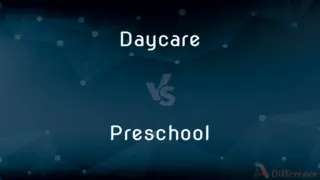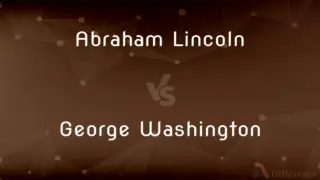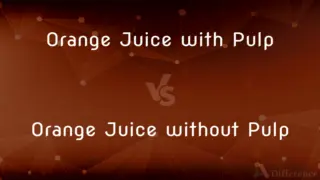Fence vs. Barrier — What's the Difference?
By Maham Liaqat & Urooj Arif — Updated on May 3, 2024
A fence is typically a structure designed to enclose or divide spaces, often made of wood, metal, or wire, while a barrier is a broader term for any obstacle that blocks or restricts movement.

Difference Between Fence and Barrier
Table of Contents
ADVERTISEMENT
Key Differences
Fences are primarily used for security, privacy, or to mark property boundaries, typically constructed from materials like wood, chain-link, or vinyl. On the other hand, barriers can include a wide range of objects or structures such as walls, gates, or natural elements designed to prevent access or progress.
While fences are often permanent or semi-permanent and visually lighter, barriers might be temporary and can vary from heavy concrete blocks to simple ropes or tape used to block access. Barriers are more about stopping movement, whereas fences can offer more than just a physical hindrance, including aesthetic contributions to a landscape.
Fences usually serve specific purposes in residential, agricultural, or commercial settings, like containing livestock or enhancing home security. Barriers, however, are utilized in broader contexts, from traffic control to crowd management, often indicating more stringent control measures.
The design and construction of a fence often consider aesthetics and functionality, supporting landscaping efforts or property value enhancement. In contrast, barriers are typically utilitarian, prioritizing function over form, such as barricades during roadworks or police lines at public events.
Fences and barriers both function to control access but differ in permanence, construction, and purpose. Fences integrate into their environment and maintain continuity, while barriers are often stand-alone structures placed to respond to temporary conditions or emergencies.
ADVERTISEMENT
Comparison Chart
Purpose
Enclosure, privacy, boundary definition
Blocking or restricting movement
Materials
Wood, metal, wire, vinyl
Concrete, metal, plastic, rope, tape
Typical Use
Property lines, agriculture, security
Traffic control, safety, crowd management
Permanence
Often permanent or semi-permanent
Can be temporary or permanent
Aesthetic Consideration
Often aesthetically pleasing
Utilitarian, function-focused
Compare with Definitions
Fence
A person who deals in stolen goods.
The stolen paintings were sold to a notorious fence.
Barrier
Something immaterial that impedes or separates.
Language barriers can hinder effective communication.
Fence
To enclose or separate an area with a fence.
The farmer fenced the field to keep the cattle from roaming.
Barrier
An obstacle that prevents movement or access.
The crowd was kept back by temporary barriers.
Fence
A means of protection or defense.
The new security system acts as a virtual fence against intruders.
Barrier
To block or obstruct with a barrier.
The police barriered the road due to the accident.
Fence
Have an argument about something
Barrier
A structure built to hold back water or carry traffic.
The dam serves as a barrier against flooding.
Fence
A fence is a structure that encloses an area, typically outdoors, and is usually constructed from posts that are connected by boards, wire, rails or netting. A fence differs from a wall in not having a solid foundation along its whole length.Alternatives to fencing include a ditch (sometimes filled with water, forming a moat).
Barrier
A natural or artificial obstruction.
The mountain range acts as a natural barrier between the two countries.
Fence
A structure serving as an enclosure, a barrier, or a boundary, usually made of posts or stakes joined together by boards, wire, or rails.
Barrier
A fence or other obstacle that prevents movement or access
The mountain barrier between Norway and Sweden
Fence
An adjustable guide with a flat edge used on a table saw and positioned parallel to the plane of the cutting attachment in order to keep the board properly positioned for the cut to be made at the correct distance from the board's edge.
Barrier
A material formation or structure, such as a mountain range or wall, that prevents passage or access.
Fence
One who receives and sells stolen goods.
Barrier
Something immaterial that obstructs or impedes
Lack of education can be a barrier to success.
Fence
A place where stolen goods are received and sold.
Barrier
(Physiology) A membrane, tissue, or mechanism that blocks the passage of certain substances.
Fence
(Archaic) A means of defense; a protection.
Barrier
(Ecology) A physical or biological factor that limits the migration, interbreeding, or free movement of individuals or populations.
Fence
To surround or enclose with a fence or other barrier.
Barrier
A movable gate that keeps racehorses in line before the start of a race.
Fence
To separate or keep out by means of a fence or other barrier
Fenced off one field from another.
Fenced out the deer from the garden.
Barrier
Often barriers The palisades or fences enclosing the lists of a medieval tournament.
Fence
To sell (stolen goods) to a fence.
Barrier
(Geology) An ice barrier.
Fence
To ward off; keep away.
Barrier
A structure that bars passage.
The bus went through a railway barrier and was hit by a train.
The bomber had passed through one checkpoint before blowing himself up at a second barrier.
Fence
To defend.
Barrier
An obstacle or impediment.
Even a small fee can be a barrier for some students.
Fence
To practice the art or sport of fencing.
Barrier
A boundary or limit.
Few marathon runners break the three-hour time barrier.
Fence
To avoid giving direct answers; hedge.
Barrier
(grammar) A node (in government and binding theory) said to intervene between other nodes A and B if it is a potential governor for B, c-commands B, and does not c-command A.
Fence
To act as a conduit for stolen goods.
Barrier
(physiology) A separation between two areas of the body where specialized cells allow the entry of certain substances but prevent the entry of others.
Fence
A thin artificial barrier that separates two pieces of land or forms a perimeter enclosing the lands of a house, building, etc.
Barrier
(historical) The lists in a tournament.
Fence
(informal) Someone who hides or buys and sells stolen goods, a criminal middleman for transactions of stolen goods.
Barrier
A martial exercise of the 15th and 16th centuries.
Fence
(by extension) The place whence such a middleman operates.
Barrier
(transitive) To block or obstruct with a barrier.
Fence
Skill in oral debate.
Barrier
A carpentry obstruction, stockade, or other obstacle made in a passage in order to stop an enemy.
Fence
The art or practice of fencing.
Barrier
A fortress or fortified town, on the frontier of a country, commanding an avenue of approach.
Fence
A guard or guide on machinery.
Barrier
A fence or railing to mark the limits of a place, or to keep back a crowd.
No sooner were the barriers opened, than he paced into the lists.
Fence
(figuratively) A barrier, for example an emotional barrier.
Barrier
Any obstruction; anything which hinders approach or attack.
Fence
A memory barrier.
Barrier
Any limit or boundary; a line of separation.
'Twixt that [instinct] and reason, what a nice barrier!
Fence
(transitive) To enclose, contain or separate by building fence.
Barrier
A structure or object that impedes free movement
Fence
(transitive) To defend or guard.
Barrier
Any condition that makes it difficult to make progress or to achieve an objective;
Intolerance is a barrier to understanding
Fence
(transitive) To engage in the selling or buying of stolen goods.
Barrier
Anything serving to maintain separation by obstructing vision or access
Fence
To engage in the sport of fencing.
Fence
To jump over a fence.
Fence
(intransitive) To conceal the truth by giving equivocal answers; to hedge; to be evasive.
Fence
That which fends off attack or danger; a defense; a protection; a cover; security; shield.
Let us be backed with God and with the seas,Which he hath given for fence impregnable.
A fence betwixt us and the victor's wrath.
Fence
An inclosure about a field or other space, or about any object; especially, an inclosing structure of wood, iron, or other material, intended to prevent intrusion from without or straying from within.
Leaps o'er the fence with ease into the fold.
Fence
A projection on the bolt, which passes through the tumbler gates in locking and unlocking.
Fence
Self-defense by the use of the sword; the art and practice of fencing and sword play; hence, skill in debate and repartee. See Fencing.
Enjoy your dear wit, and gay rhetoric,That hath so well been taught her dazzing fence.
Of dauntless courage and consummate skill in fence.
Fence
A receiver of stolen goods, or a place where they are received.
Fence
To fend off danger from; to give security to; to protect; to guard.
To fence my ear against thy sorceries.
Fence
To inclose with a fence or other protection; to secure by an inclosure.
O thou wall! . . . dive in the earth,And fence not Athens.
A sheepcote fenced about with olive trees.
Fence
To make a defense; to guard one's self of anything, as against an attack; to give protection or security, as by a fence.
Vice is the more stubborn as well as the more dangerous evil, and therefore, in the first place, to be fenced against.
Fence
To practice the art of attack and defense with the sword or with the foil, esp. with the smallsword, using the point only.
He will fence with his own shadow.
Fence
Hence, to fight or dispute in the manner of fencers, that is, by thrusting, guarding, parrying, etc.
They fence and push, and, pushing, loudly roar;Their dewlaps and their sides are bat ed in gore.
As when a billow, blown against,Falls back, the voice with which I fencedA little ceased, but recommenced.
Fence
A barrier that serves to enclose an area
Fence
A dealer in stolen property
Fence
Enclose with a fence;
We fenced in our yard
Fence
Receive stolen goods
Fence
Fight with fencing swords
Fence
Surround with a wall in order to fortify
Common Curiosities
What are common materials used for building fences?
Common materials for building fences include wood, metal, vinyl, and wire.
How do fences contribute to property aesthetics?
Fences can enhance property aesthetics by complementing the architectural style of homes or landscapes.
What is the primary function of a fence?
The primary function of a fence is to enclose or separate spaces for privacy, security, or to mark property boundaries.
Can barriers be used for security purposes?
Yes, barriers are often used for security purposes, such as blocking unauthorized access to restricted areas.
What role do barriers play in traffic management?
Barriers in traffic management guide traffic flow, restrict access to certain areas, and enhance safety by separating lanes of traffic.
Can fences serve as noise barriers?
Yes, certain types of fences, such as solid wooden fences or concrete walls, can also serve as effective noise barriers.
What is a psychological barrier, and how does it differ from physical barriers?
A psychological barrier refers to a mental or emotional block that impedes interaction or understanding, contrasting with physical barriers that physically block or impede movement.
What is an example of a temporary barrier?
An example of a temporary barrier is the plastic fencing used to cordon off construction sites.
Are fences always solid structures?
No, fences can be solid, semi-solid, or designed with spaces between elements, like picket fences or chain-link fences.
What types of barriers are used for crowd control?
Barriers used for crowd control include metal barricades, ropes, and retractable belt systems.
Share Your Discovery

Previous Comparison
Abide vs. Bide
Next Comparison
Wind vs. ZephyrAuthor Spotlight
Written by
Maham LiaqatCo-written by
Urooj ArifUrooj is a skilled content writer at Ask Difference, known for her exceptional ability to simplify complex topics into engaging and informative content. With a passion for research and a flair for clear, concise writing, she consistently delivers articles that resonate with our diverse audience.















































